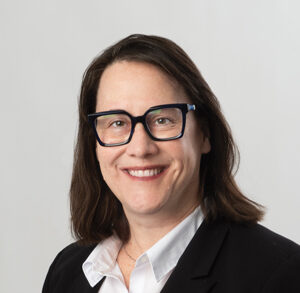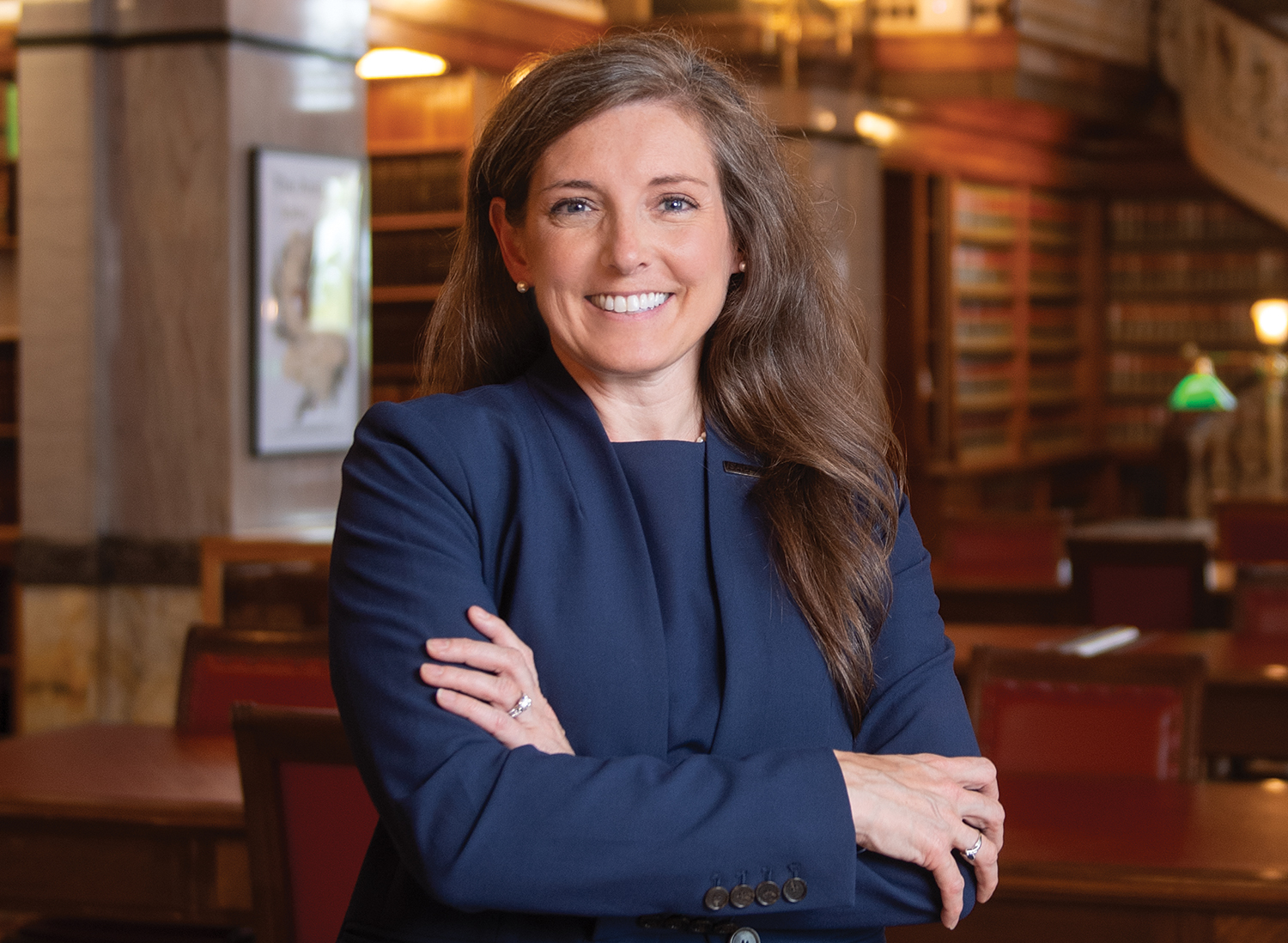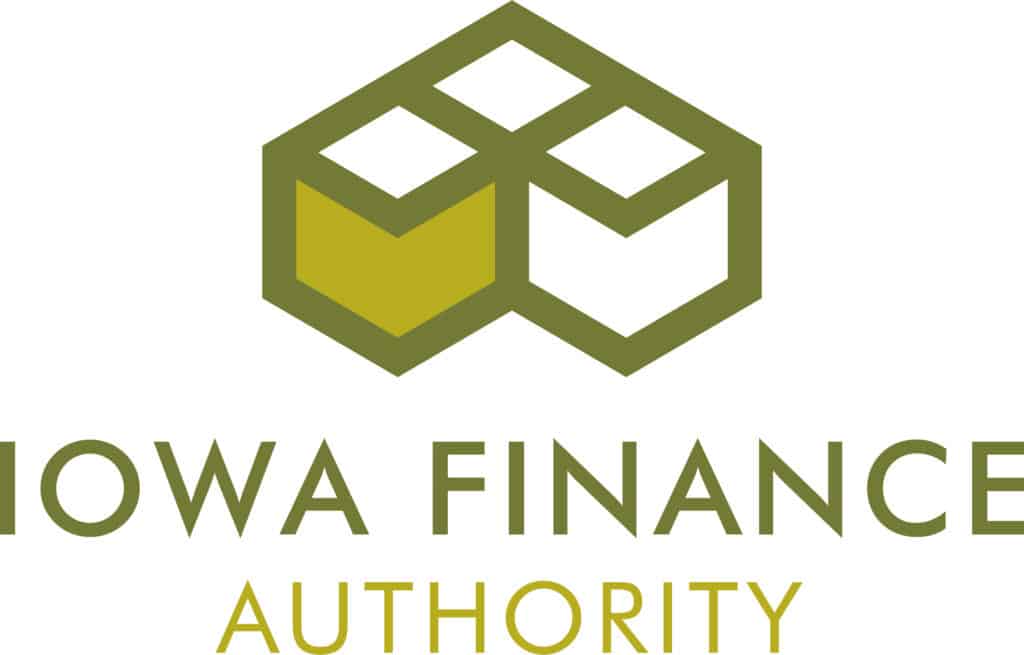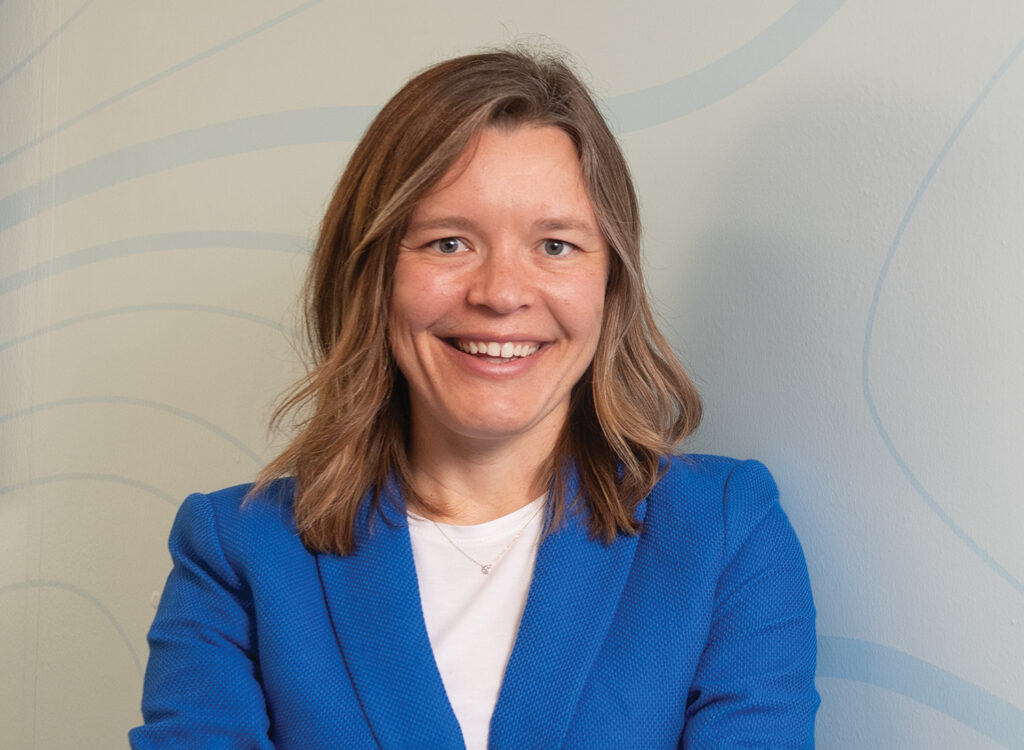Local engagement draws Woodard to ISAC

Gigi Wood Jul 25, 2025 | 6:00 am
12 min read time
2,855 wordsA Closer Look, Government Policy and LawA notable policy leader has stepped into a role that will call on her expertise, experience and love for Iowa.
Andrea Woodard joined the Iowa State Association of Counties as executive director in August 2024. The position was previously held by William R. Peterson, who worked at ISAC for 45 years and served as its executive director for 29. Woodard was able to start before Peterson departed, and attended the National Association of Counties annual conference in Tampa with him last July, where he introduced her to many of their colleagues.
“To have that personal introduction from him [was valuable and an honor],” Woodard said.
“Truly, he’s seen as sort of the dean of his peers at the national level.”
Before joining ISAC, Woodard worked at the Greater Des Moines Partnership for more than nine years as senior vice president of government relations and public policy and most recently as director of regional community integration.
Her interest in government and policy work began early in life and many of her childhood experiences prepared her for her career, she said. Woodard grew up on a farm in Shueyville in the southeastern part of Linn County, near Cedar Rapids. When she was in high school, her family’s farm had 3,500 hogs and 1,000 acres of corn and soybeans. Today, her parents still operate the farm, minus the hog operation. Growing up the oldest, with four younger brothers made her tough; she doesn’t put up with a lot of nonsense, she said.
Civic engagement and community involvement were common in her family. Her grandparents were very involved in the community and local government. One of her grandmothers was a poll worker. One grandfather served on the township board of trustees. Her other set of grandparents were involved in the Teamsters-affiliated union for the local Cryovac plant, which for many years produced plastic food packaging in Cedar Rapids.
Woodard studied political science at the University of Iowa and worked for political campaigns before becoming a legislative clerk for the Iowa State Senate. She also worked as the Iowa State House campaign manager for the Iowa Democratic Party, a regional field organizer for One Iowa and an assistant to the leader at the Iowa House of Representatives. She then joined public relations and government affairs company LS2group as an account executive before returning to the House as a research analyst and later joined the Partnership.
She now leads ISAC, a private, nonprofit corporation made up of several statewide association partner organizations. ISAC members are elected and appointed county officials from the state’s 99 counties who work together to improve and maintain effective government for Iowans. ISAC serves as an advocate for counties, providing resources, training, networking and more. In her new role, Woodard looks forward to executing the group’s strategic plan and providing services to counties.
We sat down with Woodard to learn more about her background, ISAC and her goals. for the future.
This Q&A has been lightly edited for clarity and length.
How did you get your start in government and public policy?
I ended up in Iowa City, at the University of Iowa, and always knew I wanted to do law and government. I ended up being a political science major. And that is really, truly, I think the tie-in to how I’m here at ISAC today. I did a lot of state government work post-college and I had always really been involved in the community, whether it’s Young Professionals Connection or different alumni groups and really keeping within that government affairs space. Ultimately, I ended up doing the government affairs roles at the Partnership, which I think gave me a sense of recognition that professional development and growth in my career was possible and was something I really wanted to continue to do. I had a lot of great opportunities there; I had a lot of great bosses, from Joseph Jones to Joe Murphy to Jay Byers to Tiffany Tauscheck. I had always been given opportunities to grow. I think it became clear that someday I wanted to maybe lead an organization myself.
Political science isn’t the most common major, can you talk more about what drew you to that and to government work after college?
After college, I didn’t know what I was going to do. I had found an internship online and one of my college roommate’s dads was a lawyer and lobbyist here in Des Moines. He connected me to the state Legislature, where I ended up clerking. I was bound and determined to go to law school and I kept working for attorneys, and then just never really went. I kept getting jobs in the government affairs space and I think those various influences over the years were what gave me that interest. One of my brothers, he’s had a couple of accidents over the years, and when he was 18 months old, got some pretty severe burns. Our family ended up in civil court with that situation. Being part of that process, along with all of those other things, was an influence.
I don’t know that I knew what I was going to do with the political science major, and now I serve on the University of Iowa Department of Political Science alumni board. A few years back, I was doing a class with political science students, connecting them to jobs in public policy. Particularly for those who maybe didn’t know what they wanted to do, or some people think law school or work on Capitol Hill, but there’s so many opportunities out there.
Because your roles at the Partnership have been so instrumental in shaping your career, can you talk a little more about that work?
Basically, for the first five years, my role was leading all of the public policy events. It was coordinating the Government Policy Council. I worked with my supervisor, my bosses at the time, Joseph Jones and Joe Murphy, to coordinate a lot of our public policy work. When Joe went to the Iowa Business Council, I took his spot and led more of the strategy on government affairs. We were developing our state and federal policy agenda annually for all of those years that I was there as the registered lobbyist for the Partnership; I remain a registered lobbyist for ISAC, too.
I’ve been heavily engaged in the legislative process. With the Partnership, we relied really heavily on the U.S. Chamber of Commerce for our federal advocacy. I worked closely with Iowa’s congressional delegation, and similarly here, we work really closely with NACO for our federal advocacy, as well as the Iowa advocacy, so very similar approaches.
I would say over time at the Partnership, we really plugged in more and more at the local level. The cities and counties, they are members of the Partnership. We were engaging more because a lot of the topics that were popping up at the Capitol were impacting them, maybe more heavily than they had in the past.
What about the ISAC position interested you?
We had two kids in 2021 and 2023 and I was in a headspace to think ‘What’s next?’ and saw the opportunity. A lot of these jobs don’t come open very often, so I threw my hat in. It’s government, it’s leading an organization. I loved the idea of the statewide aspect, and there was an opportunity to learn a lot. When I think about the different layers of government, the county level is one I knew the least about. Luckily, the board saw beyond that and offered me the opportunity. I think all of those connections, tying it to an interest and passion for government were interesting. Being in a membership organization is another strong tie-in. I think those were the ways that ultimately I ended up getting here. I had enough connections from the Partnership because Iowa is such a small place.
I was familiar with ISAC’s government affairs work. I had known the lobby team from my years at the Capitol, and I have always had a sense of the importance of local government and engagement at the local level. That’s where boots on the ground things get done.
Serving on the Des Moines Parks and Recreation Board reminded me of the line that, ‘All politics is local,’ and ISAC was a known [respected] quantity, the longevity of Bill’s tenure, and learning about the team, too. We have staff members like communications manager Rachel Bennett who has been here 18 years. IPAC Program Manager Tammy Norman has been here 28; there’s a lot of longevity here and commitment from the staff. The positive reputation of the organization was attractive. I had the interest in continuing to grow my career, but also serve as a leader and have an opportunity to work in all the aspects of an organization. I keep continuing to learn all the things we do. It’s amazing how much work is done in this place.
Can you give an overview of what ISAC does?
Every county is going to have three or five county supervisors, and then you have your five offices, your auditor, recorder, treasurer, sheriff and county attorney. While there are some slight exceptions to all of those, that is who we represent. All 99 counties are members of ISAC.
We are made up of 16 affiliate organizations, such as the Iowa State Association of County Supervisors. Those 16 affiliate organizations, their representatives make up our board. We have 22 board members from 17 counties.
We’ve got the 99 counties, there are 872 elected officials and in fiscal year 2024, there were 15,000 county employees statewide. In terms of the national scope, we’re one of 54 associations of our kind across the country, and we engage with them regularly. We manage and provide to counties the election software Iowa Precinct Atlas Consortium. We have the Iowa County Attorney Case Management program; it’s a case management system that county attorney offices use. Additionally, we have a couple of lobbyists on our staff. We have two attorneys who provide a lot of legal services to the counties in collaboration with the county attorneys who are, obviously, the chief legal officer of each individual county.
There are two annual conferences with a lot of education. We train new elected county officers after each election, we’re providing certification for supervisors, you name it. There’s a ton of work that goes into the education, the connecting and networking piece at the county level.
You mentioned Iowa’s 99 counties. The Iowa DOGE Task Force had suggested cutting down the number of counties in Iowa. Has ISAC talked to them about that?
It’s my understanding that that question of ‘Does Iowa have too many counties?’ comes up every decade or so. It has come up before my time, and has recently with comments from the DOGE committee. I’ll say, too, we reached out to the leaders of the DOGE committee right away. And we really, truly do see the state as a partner in what we do together. Our members serve the same constituents of theirs, and so we’ve tried to really be a contributor to the conversation at the table.
We truly believe in local control, and so that is first and foremost where our principles lie … it’s up to the people of Iowa and those local elected officials to make those decisions. There are considerations within the constitution for making changes to the county makeup, but we continue to focus on our members and what they’re wanting to see, and also continuing to offer ideas. The other piece of that has been, we’ve met with the DOGE committee a couple of times and offered not just ideas we have that need some legislative approval, but also ways in which counties are already being efficient and sharing resources. A county attorney could serve more than one county and be on the ballot in both. There are two counties that have shared auditors, recorders, and so there are a lot of things that are already happening that are geared toward efficiency, saving taxpayer dollars, and we’ve tried to highlight those existing examples to the DOGE committee as perhaps models for even expanding and incentivizing.
What is ISAC’s take on the property tax reform efforts from this year’s legislative session?
We were at the table with the drafters of the proposal that came out. When I say at the table, we spent a lot of time talking to Sen. Dan Dawson and Rep. Bobby Kaufmann as they were putting those proposals together, and they had asked us early on, ‘Understand the legislation, make sure you know what it does, make sure you know what it doesn’t do, and then come to us with your feedback.’ So that’s really the approach that we took with our members. It was, generally speaking, our perception that a change in how the system is structured was better for our members in the long run than the current system, which was based on House File 718.
We see the state administration and legislature as a partner, and the process that they took this year was, I would say, a positive one, in that there was time to review and respond.
At the end of the day, our members still believe that local control and being able to fund the priorities that their residents are asking for is the direction that we should go. But ultimately, the proposal that was put out for review was, I think, a more favorable system in the long run, and so we’re going to continue those conversations during the interim, knowing that it likely will be part of the conversation in 2026.
Are you happy with what they ended up with or are there changes you would like to see to the proposed property tax reform as it sits now?
Definitely changes. More importantly than that, and this is more just a lack of capacity of time; it just hasn’t been fully flushed out. There were some concerns with how road funding was handled, and the impact from the bill and how it would have impacted current law. I’m not saying that as clearly as our lobby team would. But what are those unintended consequences that have an impact on all of those different departments at the county level that we need to be aware of in the hope that they will be worked out in advance.
I think an easy ask that we talked about early on in session was about the Truth in Taxation postcard. (Required by law, a postcard is sent to each household showing how much its individual taxes would increase from a proposed change). It cost counties $1 million to send out, and it wasn’t as individualized as it perhaps could have been, and caused a lot of confusion for Iowa taxpayers, not to mention that it’s coming at the same time as property owners are getting their tax bill and their assessment. All three of those documents are three different tax years. So that was an ask early on of how do we either remove this letter that’s not helpful, or let’s make it better. Those are a couple of examples that we included in our conversation when we were talking about the property tax legislation.
You’ve been in this position for almost a year. How has your time here gone and what are your future goals?
It has flown by. It has been a lot of learning and I really enjoy that. I spent a lot of time at the beginning getting to know the staff here, the board members. I spent a few months this spring traveling to the 17 counties where our board members are at, and had some one-on-one time with them. We’ve always got a lot of events going on, so connecting there. At the end of July, we’ll be kicking off a 99-county tour. When we started talking with the board and staff last fall about ‘What are the strategies we want to look at?’ One of the top ones was membership engagement. We talked about how do we get the team out around the state in a concerted effort. So we’re gonna do a 99-county tour. We will not do it as quickly as Sen. Chuck Grassley does. It will probably take us longer.
Over the next year plus, we will travel to the 99 counties with a lens for sharing and making sure that ISAC members know all of the benefits that, as their membership organization, we provide, and the things that we do, putting faces with names, but I think most importantly, gathering feedback from them. What are they looking for ISAC to be doing? And I have a feeling we’ll learn even more about what some of those local issues are that each county would like us to pay attention to during the legislative session.
At a Glance
Hometown: Shueyville, Iowa
Family: Grant Woodard, spouse; two children
Education: Bachelor of Arts in political science and communications from the University of Iowa
Email: awoodard@iowacounties.org

Gigi Wood
Gigi Wood is a senior staff writer at Business Record. She covers economic development, government policy and law, agriculture, energy, and manufacturing.











